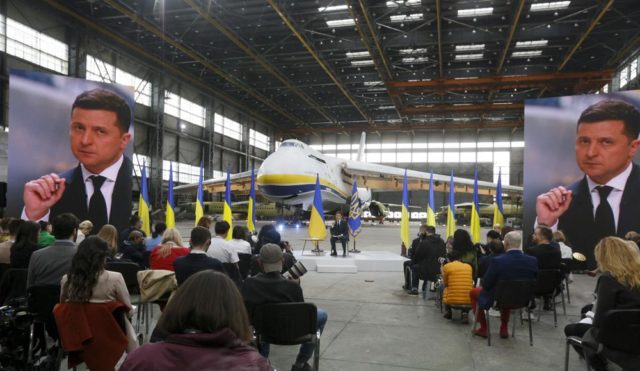
Zelenskyy Ready to Frame Poroshenko on Criminal Charges
Publication: Eurasia Daily Monitor Volume: 18 Issue: 81
By:

On May 20, Ukrainian President Volodymyr Zelenskyy, in a highly personalized form, threatened to send his predecessor, Petro Poroshenko, to prison. “I am his sentence [prigovor], he just does not want to comprehend this… I have been his sentence ever since I became president. He did a lot of very bad things when he was president,” Zelenskyy declared at his press conference marking two years since he took office as head of state (President.ua.gov, Ukrinform, May 20).
Zelenskyy had threatened to send Poroshenko to prison during the presidential election campaign in 2019; and Zelenskyy’s team went on to initiate multiple criminal investigations (more than 20 by some counts) against Poroshenko during these past two years. In 2020, Zelenskyy dismissed his hand-picked prosecutor general, Ruslan Riaboshapka, who had determined, to Zelenskyy’s disappointment, that the then-proffered accusations against Poroshenko were unsubstantiated.
At present, Zelenskyy’s law enforcement apparatus is preparing a case against Poroshenko by conflating it with the case against Viktor Medvedchuk, Moscow’s top Ukrainian political ally, detained in Kyiv since May 12 as a treason suspect (see EDM, May 17).
In addition, a Ukrainian former judge, sentenced for corruption in absentia, has been kidnapped from his Moldovan abode and smuggled into Ukraine by what appears to be Ukrainian intelligence personnel, assisted by Ukrainian embassy personnel and vehicles in Chisinau. The former judge, Mykola Chaus, is considered a possible witness in a case against Poroshenko (Hromadske, Slidstvo.Info v Ukraine, RISE Moldova, May 8; Newsmaker, May 17; Ukraiynska Pravda, May 17, 18).
On May 17, the muckraking media outlet Bihun, home of star journalist Denys Bihus’s Nashi Groshi program, stated that Ukraine’s Security Service has given it a treasure trove of audio intercepts of Medvedchuk’s telephone conversations from the period 2014–2018, some of which supposedly connect Medvedchuk with Poroshenko. President Zelenskyy’s childhood friend from Kryvyy Rih, Ivan Bakanov, is the Security Service’s chair (he is also involved in handling the Medvedchuk case). Bihus has just started serializing the audio material, probably for weeks or months to come. Introducing the material to be serialized for its mass audience, Bihus admitted that it consists of redacted fragments. Even so, Bihus has already pronounced Poroshenko an accomplice of Medvedchuk betraying Ukraine’s interests to Russia and its Donbas proxies (Bihun.info, Dzerkalo Tyzhnia, May 17).
On May 19, the Ukrainian parliament created a Temporary Investigative Commission, ostensibly in response to “audio recordings that have appeared in the mass media indicating collaboration with officials of the aggressor state” (i.e., the material that the Security Service handed over). The Commission consists of 11 members, including 8 from the pro-presidential Servant of the People party. Poroshenko’s European Solidarity Party, the other parliamentary pro-Western party Holos, and Yulia Tymoshenko’s Batkivshchyna are not represented on the Investigative Commission. However, Medvedchuk’s close associate Nestor Shufrych is the Commission’s vice-chair. The Commission shall operate for one year, potentially extendable.
The Commission’s mandate seems almost limitless and designed to look for state treason: “to find out cases of Ukrainian state officials and other persons who may have assisted the aggressor state in its unlawful activities against Ukraine, [as well as] establish the facts regarding possible unlawful actions by Ukrainian state officials involving collaboration with the aggressor state and other anti-Ukrainian activities […] threats to Ukraine’s sovereignty, territorial integrity and inviolability, defense capacity, state security, economic security and information security of Ukraine“ (Ukrinform, May 19).
The Zelenskyy presidency’s two-year anniversary, marked today (May 20), has undoubtedly inspired this surge of activity. The president has no dramatic results to show after two years in office, and today’s press conference showed that he is aware of this. Two personal ambitions that had been with him already as a presidential candidate—jailing Poroshenko and meeting one-on-one with Russian President Vladimir Putin—remain unrealized. His threat to Poroshenko (see above), amounting to “I am the law,” reflects extreme frustration as well as incomprehension of the rule of law. Cracking down on the Medvedchuk clan while hoping to meet Putin (“to end the war,” as he repeated today) are mutually conflicting policies (see EDM, May 17). United States Secretary of State Antony Blinken’s recent visit identified setbacks to economic and judiciary reforms (see EDM, May 6, 10). Zelenskyy declared in today’s press conference that Ukraine can pursue reforms on its own without US advice. Unrealistic expectations raised by the Presidential Office about a North Atlantic Treaty Organization (NATO) Membership Action Plan predictably were not borne out. The president and his Servant of the People party have sharply declined in public opinion polls in these two years.
Zelenskyy and his party can still hope to recover politically by launching the “de-oligarchization campaign.” However, the president and his close circle seem to regard de-oligarchization as a law enforcement campaign targeting specific individuals. Following Medvedchuk’s detention, Zelenskyy published a short essay in the magazine Fokus (May 12) victoriously announcing “Minus one oligarch” and predicting more such “minuses” among the country’s plutocrats. Most likely, Poroshenko would also be framed as an “oligarch” in addition to traditional corruption charges and newly-baked “treason” charges against him. Zelenskyy seems, at this point, to understand de-oligarchization as an “ad hominem” exercise.



